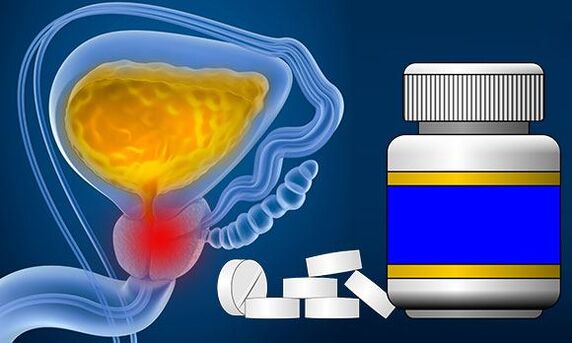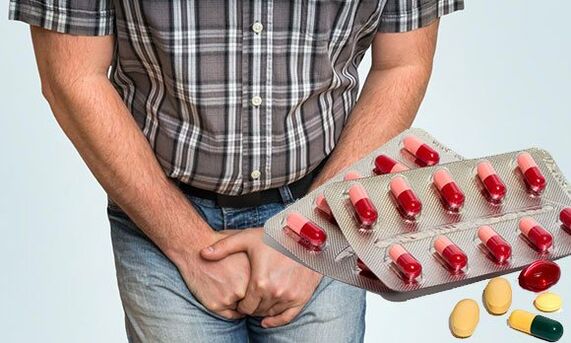
Given the ever-increasing number of prostatitis patients, the pharmaceutical industry offers hundreds of different remedies for the disease, and the arsenal of drugs is constantly replenished. Faced with this problem, most men do not go to the doctor, but to the pharmacy, hoping to get there a "miracle medicine" that will relieve them of this scourge in a couple of days. Without understanding the problem, a person does not understand which prostatitis pills are cheap and effective for him to choose. Even the pharmacist cannot answer this question for him, offering the most popular drugs that may turn out to be completely useless or even harmful.
A specialist should choose an effective therapeutic regimen, taking into account the form and stage of development of the disease, the individual characteristics of the patient and the presence of contraindications. The drugs used are divided into the following groups:
- Etiotropic: antibacterial agents designed to destroy infectious pathogens.
- Symptomatic: Relieves painful symptoms.
- Pathogenetic - contributes to the elimination of congestion in the pelvic area, improves the blood supply to the prostate gland.
Complex drug therapy includes the use of such drugs:
- Antibiotics.
- Anti-inflammatory.
- α-blockers.
- Antispasmodics.
- Means for improving blood circulation.
Consider in detail the pills for prostatitis in men.
Antibacterial agents
They represent a shock group in the composition of drug therapy, are used in acute and chronic diseases. Their task is to destroy pathogenic microorganisms, relieve symptoms of intoxication and reduce inflammation. Since each infectious agent is sensitive to certain antibiotics, bakposev is carried out to select the right medicine.
Drugs for the treatment of prostatitis in men are available in tablets, in injectable form, in the form of rectal suppositories and solutions for instillation (injection of drugs into the urethra). Urologists are of the opinion that with inflammation of the prostate, the most pronounced therapeutic effect is observed with rectal administration of the drug.
The antibiotics used are divided into the following groups:
- Fluoroquinolones: have the most pronounced therapeutic effect.
- Cephalosporins are effective against many pathogens but have a short duration of action.
- Aminopenicillins - are indicated for mild inflammations, without complications, rare exacerbations of the chronic form.
- Tetracyclines - rarely cause side effects. Compared to other antibiotics, they show more pronounced activity against atypical pathogens (mycoplasma, chlamydia).
- Macrolides - have a weak therapeutic effect, but at the same time have low toxicity.
The complex treatment regimen includes antibacterial drugs:
| Group of drugs | Features of the clinical application |
|---|---|
| Protected Aminopenicillins | They are used for the acute process and rare exacerbations of chronic prostatitis caused by exclusively typical microflora. Inactive against atypical pathogens. |
| Fluoroquinolones | They differ in the expressed antibacterial effect concerning the majority of typical and atypical microorganisms. They penetrate and concentrate perfectly in the tissues of the prostate. They have a prolonged action, so they are prescribed once a day. |
| Cephalosporins | They have a broad spectrum and a short duration of antibacterial action. They can constitute a shock group of antibiotics in the treatment of any form of prostatitis. |
| macrolides | Antibacterial agents with prolonged daily action and cumulative capacity. They penetrate well into the prostate tissue. They show the greatest activity against atypical pathogens. All this allows the use of this group of antibiotics for the treatment of any type of prostatitis. |
| Other antibacterial agents | They constitute an additional group of drugs used in addition to the main drugs in complex treatment regimens. |
Anti-inflammatory drugs

Anti-inflammatory drugs for prostatitis are used in combination with antibiotics. Non-steroidal drugs help reduce swelling of the gland, thereby reducing urethral compression and difficulty in urinating. In addition, these drugs have an analgesic effect. If the drugs of this group do not have a positive effect, the patient is prescribed potent hormonal anti-inflammatory drugs.
Other meanings

One of the most unpleasant symptoms of prostatitis is urination problems resulting from spasms of the smooth muscle of the gland and urea. To eliminate this violation, a group of α-blockers is used. Their action is aimed at relaxing the muscle fibers and promoting the release of urine.
To reduce inflammation and relieve pain, antispasmodics are prescribed.
Today it is impossible to name the best medicine for prostatitis, as each patient reacts differently to drug therapy. Means which are effective in one case can be completely useless for another patient.
Inflammation of the prostate gland develops not only due to exposure to pathogens, but also due to congestion. Such disorders also prevent rapid tissue regeneration, restoration of the functions of the affected organ and reduce the therapeutic effectiveness of drugs. To eliminate them, drugs are used to improve the blood supply to the gland.
Preventive measures
To maintain a healthy prostate, you need:
- Proper nutrition - the diet should include foods that provide the body with the necessary macro and microelements, vitamins.
- Regular intimate life.
- Timely diagnosis and treatment of diseases of the genitourinary system.
- Sufficient physical activity.






















